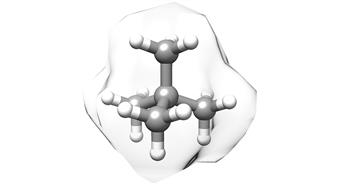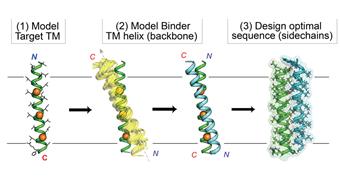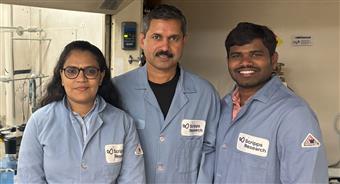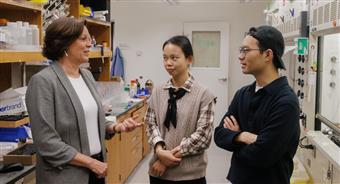
An influenza virus mutation could be the secret to better egg-based seasonal vaccines
June 05, 2019
When is a mutated virus a good thing? When the mutation could make flu shots more powerful.
Scientists at Scripps Research have found that a mutation called G186V could be a useful addition to the H3N2 influenza vaccine. As they reported in Cell Host & Microbe, preparing a seasonal flu vaccine with the G186V mutation may prevent a vexing problem that commonly occurs during the vaccine manufacturing process.
This study gives us a roadmap to suggest how to improve the vaccine, says Ian Wilson, D.Phil., Hansen Professor of Structural Biology at Scripps Research.
Wilson co-led the study with Chris K.P. Mok, PhD, of The University of Hong Kong and the First Affiliated Hospital of Guangzhou Medical University. Their work builds on a 2017 study that revealed that the common practice of growing the flu vaccine in eggs leads to a mutation called L194P, which keeps the vaccine from working as well as it should in humans.
For decades, vaccine manufacturers have made the flu vaccine by injecting influenza into chicken eggs. This is a relatively cheap way to allow the virus to replicate. Manufacturers then purify the fluid from the eggs to get enough of the virus to use in vaccines.
But this method comes with drawbacks.
These are human viruses, and you're growing them in an avian species, says Wilson. Putting the virus in this challenging environment forces the virus to mutate to adapt and survive. They're acquiring mutations in order to grow better.
As the virus mutates inside eggs, it becomes less like the viral strains circulating among the human population. A vaccine containing the L194P mutation is less likely to prompt the human immune system to recognize and attack the real virus. Wilson and his colleagues say this is one factor behind the low effectiveness of some seasonal flu vaccines in recent years.
For the new study, the researchers looked at other mutations that cropped up near the same site on the surface of the virus. Nicholas Wu, PhD, a research associate at Scripps Research, led the work to analyze mutations that appeared in the specific H3N2 strains selected for use in flu vaccines going back through the years.
Wu saw that the L194P and G186V mutations were very common in the egg-grown virus. Both of these mutations are well-known in the field for helping the virus grow in eggs, but Wu realized that the two mutations never showed up in the same virus.
The scientists then tested a theory that the two mutations were in opposition. The team studied influenza's structure and showed that L194P and G186V functionally compete around the receptor binding site on the virus surface. Whichever mutation occurred at that site first was there to stay and would prevent the other mutation from occurring.
These two mutations are incompatible with each other, says Wu.
But while L194P harmed the flu shot's effectiveness, G186V did not. The scientists found that the immune system treats the G186V virus as if it were similar to the circulating human virus.
Wilson and Wu say it will be important for vaccine manufacturers to test for these two mutations and select for H3N2 strains that contain G186V, before growing up the vaccine strains into eggs.
Going forward, the team hopes to screen influenza for more mutations that occur during the egg manufacturing process and better understand how these mutations interact.
It's important to try to figure out how we can make the seasonal flu vaccine better, especially for H3N2 viruses, says Wilson.
In addition to Wilson, Mok and Wu, authors of the study, Preventing an Antigenically Disruptive Mutation in Egg-Based H3N2 Seasonal Influenza Vaccines by Mutational Incompatibility, were Huibin Lv and Wilson W.S. Ng of The University of Hong Kong and the First Affiliated Hospital of Guangzhou Medical University; Andrew J. Thompson, Rameshwar U. Kadam, Chih-Wei Lin, Corwin M. Nycholat, Ryan McBride and James C. Paulson of Scripps Research; Douglas C. Wu of the University of Texas at Austin; and Weiwen Liang of the First Affiliated Hospital of Guangzhou Medical University.
The study was supported by the National Institutes of Health (grants R56 AI127371 and R01 AI114730); the Bill and Melinda Gates Foundation (grant OPP1170236 and a Post-Doctoral Fellowship in Global Health); the Research Grants Council of the Hong Kong Special Administrative Region, China (Ref: T11-705/14N); and Guangzhou Medical University High Level University Construction Project Funding.
Infectious Diseases Immunology & Microbiology Wilson, Ian
More from Scripps
20/04/2024
New copper-catalyzed C-H activation strategy from Scripps Research Two-mode reactions inspired by human detox enzymes offer powerful new tools for drug discover...
12/04/2024
Scripps Research chemists devise easier new method for making a common type of building block for drugs Scientists transform simple linear amines into saturated...
06/04/2024
A simple, inexpensive way to make carbon atoms bind together A Scripps Research team uncovers a cost-effective method for producing quaternary carbon molecules,...
04/04/2024
Developing a vaccine for the zombie drug xylazine Scripps Research chemical biologists design an early proof-of-concept vaccine that could lead to the first...
30/03/2024
How blocking a neural receptor responsible for addiction could reduce alcohol use A Scripps Research team found that a new therapeutic that targets the kappa op...
13/03/2024
New computational strategy boosts the ability of drug designers to target proteins inside the membrane Customized-design approach could streamline the design of...
29/02/2024
Scripps Research scientists reveal how first cells could have formed on Earth New phospholipid discovery brings researchers closer to understanding how primordi...
29/02/2024
How molecular handedness emerged in early biology Scripps Research chemists fill a major gap in origin-of-life theories.
February 28, 2024
LA JOLLA, CA Mole...
22/02/2024
Snaking toward a universal antivenom Scripps Research scientists discovered antibodies that protect against a host of lethal snake venoms.
February 21, 2024
...
06/02/2024
Calibr-Skaggs announces expansion of option and license agreement with AbbVie to develop novel cell therapies for solid tumors and autoimmune diseases
AbbVie...
26/01/2024
Re-energizing mitochondria to treat Alzheimer's disease Scripps Research team restored neuron-to-neuron connections in human cells.
January 25, 2024
LA JO...
24/01/2024
100 years of Science Changing Life: Scripps Research celebrates a century of transforming human health For the last century, institute leaders and renowned scie...
23/01/2024
New technology lets researchers track brain cells' off switches The method could shed light on what goes awry in numerous brain conditions when neurons ar...
09/01/2024
Three decades of giving: Announcing the Calibr-Skaggs Institute for Innovative Medicines The ALSAM Foundation, founded by the Skaggs family, provides lasting g...
04/01/2024
Life science entrepreneur Gene Lay joins Scripps Research Board of Directors Lay, founder of the global biotech company BioLegend, brings invaluable experience ...
21/12/2023
Taming a plant-derived toxin Scripps Research team modifies the traditional poison picrotoxinin for potential neurological drugs and anti-parasite treatments. ...
19/12/2023
Scripps Research Executive Vice President Eric Topol gives TED talk on transformative power of AI in medicine Topol provides an overview of how AI models can i...
13/12/2023
New AI-powered algorithm could better assess people's risk of common heart condition Early detection of atrial fibrillation can reduce the risk of stroke an...
07/12/2023
Nanoparticle flu vaccine design shows promise in early tests Scripps Research-designed vaccine could provide broad, enduring protection against influenza A str...
16/11/2023
Numerous Scripps Research scientists named Highly Cited Researchers Clarivate's annual, global list represents researchers who have demonstrated significant...
07/11/2023
Multiple sclerosis drug invented at Scripps Research slows long-term devastating disease progression Late-breaking data reinforces the effectiveness and safety ...
05/10/2023
Keren Lasker named a 2023 Moore Inventor Fellow The prestigious award will support Lasker's inventive research in membraneless organelles and their applica...
22/09/2023
Michael Bollong named a 2023 Amgen Young Investigator The prestigious award will support Bollong's research identifying new molecular targets and therapeuti...
09/09/2023
Philip Dawson receives 2024 American Chemical Society National Award Dawson is honored with the Arthur C. Cope Late Careers Scholar Award for his foundational c...
07/09/2023
Scripps Research chemists devise a method for C-H activation of alcohols The method represents a new toolkit for making drugs and other compounds.
September 06...
31/08/2023
Scripps Research receives $1.5M to surveil infectious disease threats in wastewater Bill & Melinda Gates Foundation award to support the development of multi-pa...
16/08/2023
How cold temperatures trigger the brain to boost appetite Scripps Research scientists' discovery could lead to new weight loss and metabolic health treatmen...
08/08/2023
Human antibody that targets carfentanil, fentanyl and related opioids reverses overdose effects in preclinical study Scripps Research-developed antibody therapy...
04/08/2023
How sensory neurons impact the gut Scripps Research scientists show that the receptor PIEZO2 in sensory neurons controls gut motility and transit time, which a...
26/07/2023
AbbVie and Calibr Expand Strategic Collaboration to Advance Several Preclinical and Early-stage Clinical Assets The expanded strategic collaboration will advan...
23/07/2023
Scripps Research scientists develop AI-based tracking and early-warning system for viral pandemics Machine-learning system effectively predicts emergence of pro...
19/07/2023
Monitoring T cells may allow prevention of type 1 diabetes Scripps Research study shows that analyzing T cells in blood samples could be used to select at-risk ...
19/07/2023
Scripps Research mourns passing of leading organic chemist Albert Eschenmoser Eschenmoser pioneered key reactions in synthetic chemistry and shaped the understa...
15/06/2023
Scripps Research awarded $46.8 million by NIH to promote human health through innovative translational science and training The Translational Institute is harne...
13/06/2023
Scripps Research's Danielle Grotjahn named 2023 Pew Scholar in the Biomedical Sciences The award will support Grotjahn's study of how cells assemble the...
31/05/2023
Crossing the ring: new method enables C-H activation across saturated carbocycles Scripps Research chemists add another powerful tool to their molecular editin...
24/05/2023
Scripps Research develops behind-the-scenes tool for better biomedical data discovery The new resource makes datasets more discoverable for life science communi...
19/05/2023
Scripps Research neuroscientist Hollis Cline elected to American Academy of Arts and Sciences Cline is recognized for her discoveries about the role of sensory ...
19/05/2023
Scripps Research's Skaggs Graduate School awards doctoral degrees to 31st graduating class Commencement ceremony will be livestreamed via Zoom and on instit...
13/05/2023
A better route to benzocyclobutenes, sought-after building blocks for drugs Scripps Research chemists devise a new, C-H activation-based method for the synthesi...
09/05/2023
Renowned Scripps Research professor Jeffery Kelly elected to National Academy of Sciences Kelly's groundbreaking work on protein misfolding has led to thera...
28/04/2023
Mirror-image molecules pave new path for cancer drug discovery By comparing how mirror image versions of small molecules impact clusters of proteins, Scripps R...
22/04/2023
How alcohol consumption contributes to chronic pain A Scripps Research team showed how both alcohol intake and alcohol withdrawal can lead to increased pain and...
21/04/2023
Xin Jin receives dual awards to study autism risk genes in neurodevelopment Major grants from the National Institutes of Health and California Institute for Reg...
20/04/2023
Trim the sugar: New HIV vaccine design improves immune response Scripps Research vaccine candidate headed for clinical trials.
April 19, 2023
LA JOLLA, CA A...
18/04/2023
Therapeutic can seek and destroy potent opioid to treat overdoses Scripps Research chemists developed a new biologic to work against the synthetic opioid carfen...
07/03/2023
How heavy alcohol consumption increases brain inflammation The findings by a Scripps Research team point toward a potential new drug target for treating alcohol...
02/03/2023
Scientists find human antibodies that can block multiple coronaviruses including SARS-CoV-2 Results from a Scripps Research and UNC team pave the way for a vacc...
28/02/2023
$10 million grant funds Scripps Research Alcohol Research Center through its 50th year The five-year grant supports research into the neurobiology of alcohol us...
28/02/2023
Immune system drug shows promise in treating alcohol use disorder, a Scripps Research clinical trial reports Scientists at Scripps Research found that apremilas...
 An influenza virus mutation could be the secret to better egg-based seasonal vaccines
An influenza virus mutation could be the secret to better egg-based seasonal vaccines 























